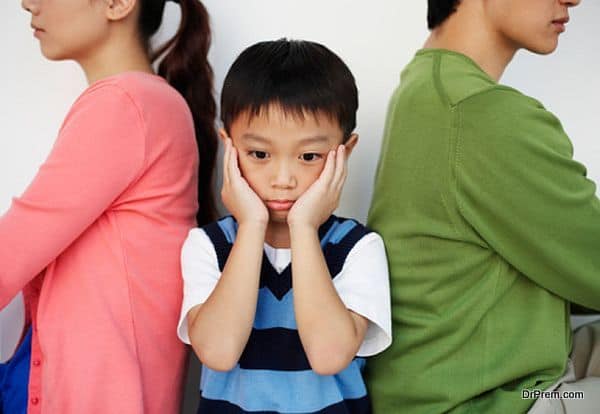For any child, the divorce of parents can be very traumatic and devastating. The togetherness and joy of sharing and caring for each other come crashing down when parents separate and go separate ways. Whilst nothing can be done to bring them back together, there are several ways by which you can cope.
How to Help Your Child Deal with Divorce
Divorce can be hard on the entire family. But for your children, it can be a traumatic experience. Although you can’t change the conditions of your family, you can help your child deal with divorce in these ways.
1. Telling your child about the divorce
The first step to help deal with your child with divorce is to break the news to her/him. You and your spouse must break the new together. Make sure that you don’t discuss ugly details of your divorce with your child, no matter what her/his age is. Just explain that you and your spouse are having trouble getting along and it would be best if you stay apart. Tell your child that you will always remain her/his parents even if you both aren’t wife and husband. You can even tell your child’s school counselor, this way the counselor will able to observe the changes in your child and help her/him at the school level.
Moreover, it will help you to know how your child is coping up with everything. Remember, your child will experience a lot of overwhelming emotions when this news is broken to her/him. So, expect a variety of reactions. Children who have perceived their families as positive prior to the breakup may feel too overpowered.
So, let them grieve. Sit with your child till the time she/he is grieving. Apart from this, you must expect your child to react differently after the divorce. For instance, your child may react in different manners to her/his parent’s ideas of dating someone, remarrying, and getting new siblings. Some children may have anger management issues. In such cases, school counseling and peer support may help the child a lot. So, be ready to anticipate the changes in your child’s behavior.
2. Reassure your child
For children, a divorce may seem like the end of their world. They may feel lonely and depressed. Therefore, as parents, you must reassure your child that you and your spouse will always be there for him. Make sure that you never let the differences between you and your spouse ruin the childhood of your kids. In certain situations, your spouse may not be able to reciprocate to the child or may not be there for him. In such conditions, you must be ready to play both the roles. Be warmer and accept of your child.
Also, don’t force them too hard for things. You may notice that their grades may drop in school and they might refrain from discussing their issues with you or your spouse. So, try to spend more time with your child. Break the communication barriers and let the child ask your questions about life or divorce. In fact, encourage your child to discuss divorce or ask questions about it. We don’t want you to explicitly discuss all gore details of your relationships. So, talk to your child and tell her/him about divorce issues that are equivalent to her/his age. Tell your child that they are not the reason for the divorce and they cannot control or change the situation.
3. Keep your child out of your fights
No matter how old your children are, never let them come into your fights with your ex-spouse. Respect your child’s relationship with your ex-spouse. So, never ever speak about your ex-spouse in front of your child. Never make any accusations against the spouse. For these purposes, find a friend to confide with. Don’t make your child to work as a messenger between your issues with your ex-spouse and also don’t force your child to choose any sides. Try not to argue or discuss child support issues in front of your child.
4. Allow your child to express and follow a routine
Apart from encouraging your child to ask questions, allow her/him to express their feelings. Listen to your children’s thoughts. They may express feelings of sadness, loss, or frustration that you may not have expected them to experience. Listening carefully will allow you to understand your children. Notice their moods and acknowledge their feelings. They may accuse you of the divorce or they may act out angrily upon you. In such situations, try to understand that this is just the pent up anger and frustration of your child. Be patient and provide unconditional love by judging them for what they are saying.
Also, repeat that the divorce is mutual and try to make him/her understand that you and your spouse are responsible for the divorce without blaming anyone. At the same time, try to maintain a routine. Have time for eating, sleeping, playing, talking, homework, T.V. viewing, or fun activities. Maintaining a routine will help your child to observe rules and help her/him to have a normal life. This will help you and your child cope with the divorce. If you don’t have the custody of your child, then see her/him as often as possible. Observe that your child eats healthy and has good peer support.
5. A friend helping with the transition
Parents can help a child deal with divorce. But if you have a teenager, then it would be good if you seek the help of her/his friends. A friend can help your child deal with divorce in many ways. Your child’s friend can be a great listener, a good conversation starter, and can observe your child’s behavior in case you can’t. At the same time, encourage your child to take up any activities of her/his interests like dancing or singing.
Kids can be allowed to join drawing classes that will help them to release anger, worry, guilt, sadness, loneliness, sadness, and nervousness. If the child experiences depression or anger management issues, then you must consult a therapist or a counselor who can help your child release all the negative energies. Remember, this is a difficult time and you need to be for your child to help him break the shackles of the past and create a positive future.
How to Deal with Your Parent’s Divorce
For any child, the divorce of parents can be very traumatic and devastating. The togetherness and joy of sharing and caring for each other come crashing down when parents separate and go separate ways. Whilst nothing can be done to bring them back together, there are several ways by which you can cope.
1. Don’t let your feelings get the better of you
People who come from broken homes fall prey to several problems ranging from feelings of anger, sadness, and depression to concentration issues. Additionally, you may also find yourself preoccupied with a sense of responsibility towards a particular family member and growing concerns about the future. However, no problem is ever too large to deal with. By sharing your thoughts with friends or near and dear ones you can fight these feelings quite effectively.
More often than not, kids of parents who have divorced recently get hooked on terrible and intense emotions like hostility, blame, depression, grief, anger, revenge, or guilt. In dealing with such emotions and feelings, people often end up simply being an emotional freak. These people develop a tendency to bury their feelings deeper instead of finding ways to work them out in a safe and structured manner. Hence, be sure to allow those emotions find a passage out of your system.
2. Be aware of things that might happen
In a majority of the cases, people simply refrain from having accurate and open communications with their children. If your parents don’t appear keen on having a conversation with you, then go ahead and approach them directly. By doing so, you’ll be helping yourself deal with the consequences of divorce better. However, be sure to focus on decisions likely to affect you in the future and not on issues that are part of parentâ’s private domain. Again, it is absolutely imperative that you prevent yourself from forming unhealthy alliances with people. There are countless examples of cases where one parent tried using the child as a weapon to dissuade the other. Your parents might not be exceptions either. Each will try to project their side as the most vulnerable one by openly criticizing or blaming the other. Harsh as it may sound, yet you should not take sides or sound biased.
3. Try and help your parents deal with the divorce
Divorce affects each and every member of the family in one way or the other. Hence, the phase is difficult not only for you but for your parents as well. However, instead of blaming them irrationally, you must understand that they have not opted for divorce intentionally. The involvement of a child always makes a divorce more difficult to deal with. Therefore, it is your responsibility to make them understand and believe that you can tide over the crisis. When it comes to handling the situation effectively, there arenât any hard and fast rules. It depends entirely on the person and how much he or she is willing to move on. Concentrate on issues that matter to you other than the divorce. Refrain from making important decisions during the phase.
4. Seek the help of people or resources outside the family
It is a common tendency among families to isolate themselves from the world outside in the hour of crisis. They tend to grow overprotective about issues concerning the household. However, you can never expect this approach to work for any situation whatsoever. While undergoing parent’s divorce, you must seek the company of people close to you. It is them-the near and dear ones- who can truly help you put the unpleasantness behind and move on in life. Additionally, you can find countless established groups like professional counseling agencies or self-help groups who work day and night to help people get through a particularly tricky phase in life.
5. Don’t face the crisis alone
Before we get into further discussions it should be noted that there is no virtue in facing a crisis all by yourself. In fact, having loved ones by your side during crisis situations is actually a blessing that many of us fail to realize. Do not expect isolation to help you move ahead in any way whatsoever. Isolation can lead to an increase in stress levels. You might cherish independence for a while, but when it comes to facing the reality, there is nothing more effective than the acceptance and support of friends and relatives. Again, it is important to remember that parent’s divorce strips you off tons of valuable energy.
The resultant stress is bound to take a toll on your health, thereby complicating things further. Emotions deserve equal attention to everything else in your life. Therefore, find ways of letting those emotions escape. You should make it a point to understand that emotions are very much a part of your overall existence. Keeping them bottled up will make your survival tougher. Take time off to rest, recreate, or hang around with friends.
6. Cope with the change
Though at first, the divorce might come as a shock and the social stigma attached to it can be unbearable, with time, you will learn to accept it and cope with the divorce of your parents. To accelerate the coping process, you must learn to ignore remarks about your parentsâ divorce and insinuations from friends and foes alike. The incident is fresh in their mind and once they have moved on to better incidents, you will soon be left alone. Therefore, learning to deal with this phase is very important for long term mental well being.
7. Remain calm and confident
Stay cool and confident without reacting when people approach you with questions. Be polite and answer normally without getting perturbed. Do not allow yourself to be in a position to be questioned too much. You may leave the group if you find that friends are getting increasingly inquisitive. Get an excuse ready in such circumstances so that you can act fast.
8. Stay involved
Many kids withdraw into a cocoon when their parent’s divorce. This is their way of avoiding attention and coping. This can only lead to more problems as one day you have to eventually face the world where the questions are sure to follow you. Deal with the questions head-on and stay involved with everything as you used to be when your parents were not divorced. Do not let this incident dampen your spirits. Confide in your trusted friends and relatives and make sure that you do not isolate yourself in any way from the outside world. Go ahead and enjoy life. Your parent’s divorced status has nothing to do with your happiness and success in life. Understand this and prepare your mind to get past this state and become successful in life.
9. Support groups
Some kids break under the pressure and trauma of parent’s divorce. This is true when they have been very close to a parent and suddenly when he/she is no longer available for support on a daily basis, it can take a toll on their well being and mental as well as physical development. Child psychiatrists must be consulted in such cases or counseling must be given to the child in order to get over this situation. Talk to your school or college counselor and seek advice from him/her to keep your mind busy and strong.
10. Family and friends count
Kids have very delicate minds and in order that they develop into matured and balanced individuals, they need the love, care and support, and sharing atmosphere of a family. In the absence of this unity, they need extra support and care and counseling as well to develop into mature and strong minds. It is the responsibility of the parents or family members to make such kids remain happy and free from depression. Reach out to your uncles, aunts, grandparents, and friends to sail through this difficult situation.
11. Help your siblings
Just as important as your mental health is the mental health of your siblings. Younger siblings need more care and help when the parents are divorced. Understand their needs and help them cope and recuperate as well. If you are the elder sibling, it is part of your responsibility to give them adequate care and support during this time. Probably they do not know the full implication of parents’s divorce at this time. Help them understand the situation and offer them the best possible help and support as much as you can. Ensure that they are comfortable at home and do not miss their parents too much.
12. Keep in touch
The new trend is that after the divorce of parents, children lose touch with the parent with whom they are not living. This is true when the other parent has married and gone his/her ways. It is important to stay in touch with your parents even after they have separated. The memories and the joys and sorrows that you have shared together as a family can never be forgotten and the fact that they will always remain your parents even after a divorce should help you stay in touch with them all throughout their lifetime. Ensure that you meet your parents at least once a month or be in touch over the phone if you are too busy.






